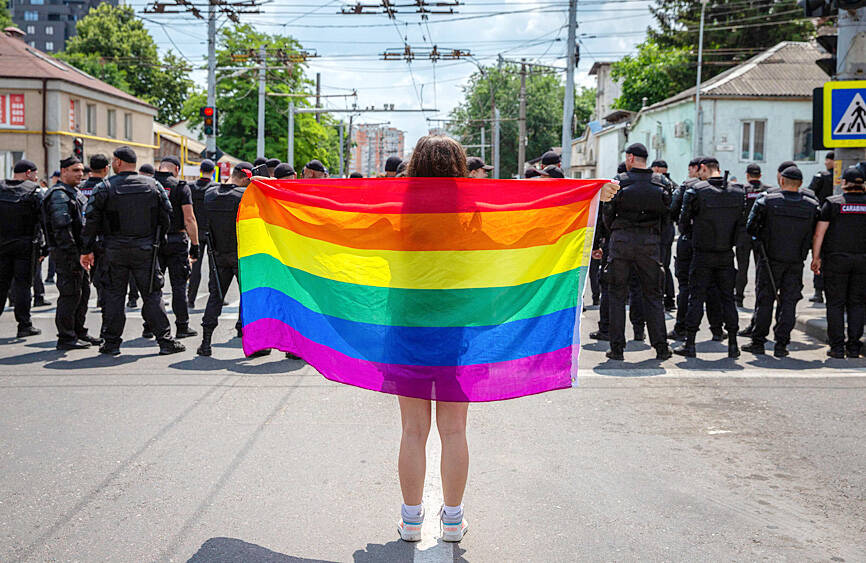Activists from Moldova’s LGBT community on Sunday held a Pride march that for the first time needed no heavy police cordons to protect them from protesters largely linked to the Orthodox Church.
The peaceful event, with hundreds strolling through the center of the capital, Chisinau, signaled a change in social attitudes, though public opposition to equal rights for gays still runs high in many former Soviet states.
Since the 2020 election of pro-European Moldovan President Maia Sandu, the nation has set a foreign policy goal of joining the EU — a pledge underscored by an outdoor public assembly last month attended by thousands.

Photo: AFP
“Judging from the march, European Moldova is progressively moving toward a normal society of people with diverse views,” said Alexei Marcicov of the event’s organiser, GenderDoc-M.
“Political will is still needed in order for us to be accepted in normal fashion in this society,” Marcicov added.
About 100 Orthodox clerics and their sympathizers stood at one point on the parade route with placards reading: “We stand for the traditional family.”
However, there was no contact between the two opposing groups and no need for police intervention.
Moldova lies between Ukraine and EU member Romania and about 90 percent of its population professes ties to one of two branches of the Orthodox Church — one linked to Russia and the other to Romania.
The Moscow-linked church denounced the march; the Romanian branch tried to play down its importance.
Movements for LGBT rights are also making progress in Ukraine, where a 2021 march took place without incident.
Ukrainian President Volodymyr Zelenskiy has expressed sympathy for upholding gay rights while ruling out constitutional changes to allow single-sex marriages while the nation is at war.

The collapse of the Swiss Birch glacier serves as a chilling warning of the escalating dangers faced by communities worldwide living under the shadow of fragile ice, particularly in Asia, experts said. Footage of the collapse on Wednesday showed a huge cloud of ice and rubble hurtling down the mountainside into the hamlet of Blatten. Swiss Development Cooperation disaster risk reduction adviser Ali Neumann said that while the role of climate change in the case of Blatten “still needs to be investigated,” the wider impacts were clear on the cryosphere — the part of the world covered by frozen water. “Climate change and

Packed crowds in India celebrating their cricket team’s victory ended in a deadly stampede on Wednesday, with 11 mainly young fans crushed to death, the local state’s chief minister said. Joyous cricket fans had come out to celebrate and welcome home their heroes, Royal Challengers Bengaluru, after they beat Punjab Kings in a roller-coaster Indian Premier League (IPL) cricket final on Tuesday night. However, the euphoria of the vast crowds in the southern tech city of Bengaluru ended in disaster, with Indian Prime Minister Narendra calling it “absolutely heartrending.” Karnataka Chief Minister Siddaramaiah said most of the deceased are young, with 11 dead

Poland is set to hold a presidential runoff election today between two candidates offering starkly different visions for the country’s future. The winner would succeed Polish President Andrzej Duda, a conservative who is finishing his second and final term. The outcome would determine whether Poland embraces a nationalist populist trajectory or pivots more fully toward liberal, pro-European policies. An exit poll by Ipsos would be released when polls close today at 9pm local time, with a margin of error of plus or minus 2 percentage points. Final results are expected tomorrow. Whoever wins can be expected to either help or hinder the

DENIAL: Musk said that the ‘New York Times was lying their ass off,’ after it reported he used so much drugs that he developed bladder problems Elon Musk on Saturday denied a report that he used ketamine and other drugs extensively last year on the US presidential campaign trail. The New York Times on Friday reported that the billionaire adviser to US President Donald Trump used so much ketamine, a powerful anesthetic, that he developed bladder problems. The newspaper said the world’s richest person also took ecstasy and mushrooms, and traveled with a pill box last year, adding that it was not known whether Musk also took drugs while heading the so-called US Department of Government Efficiency (DOGE) after Trump took power in January. In a